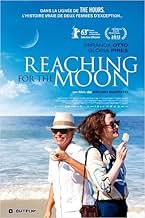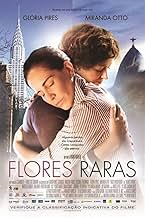AVALIAÇÃO DA IMDb
7,0/10
3,7 mil
SUA AVALIAÇÃO
Crônica da trágica história de amor entre a poeta americana Elizabeth Bishop e a arquiteta brasileira Lota de Macedo Soares.Crônica da trágica história de amor entre a poeta americana Elizabeth Bishop e a arquiteta brasileira Lota de Macedo Soares.Crônica da trágica história de amor entre a poeta americana Elizabeth Bishop e a arquiteta brasileira Lota de Macedo Soares.
- Direção
- Roteiristas
- Artistas
- Prêmios
- 9 vitórias e 21 indicações no total
Avaliações em destaque
Overall had a very good impression of the movie. I think it balanced well certain aspects... especially in the portrayal of their romance. They avoided being overly prudish and that made the romance seem more real. Without getting too kinky and losing focus. The contrast between the two characters is really interesting.
The actress Gloria Pires who portrays Lota de Macedo Soares has worked in dozens of soap operas and that sometimes comes through in her films, but not this time thankfully. She so embodies the force of nature that was Lota and this comes through the screen very well. I felt like I was seeing a member of my old Rio family... so her amazing portrayal was certainly the highlight of the film for me.
PS: Being a Macedo Soares myself (but too young to have known Lota)... there might be a bit of bias in my review.
The actress Gloria Pires who portrays Lota de Macedo Soares has worked in dozens of soap operas and that sometimes comes through in her films, but not this time thankfully. She so embodies the force of nature that was Lota and this comes through the screen very well. I felt like I was seeing a member of my old Rio family... so her amazing portrayal was certainly the highlight of the film for me.
PS: Being a Macedo Soares myself (but too young to have known Lota)... there might be a bit of bias in my review.
Reaching for the Moon (2013)
Wonderful! The story of the Brazilian years of the great North American poet, Elizabeth Bishop. There are so many beautiful aspects to the characters, their setting, and their relationships it's hard to know where to begin. And even better, on top of all this, is the historical recreation of the times, and the changing political climate of Brazil. It's touching and uplifting and tragic.
The original title of this is "Flores Raras" because these were indeed rare people, and doing beautiful things. And yes, they were reaching for the moon but you might rather say they reached the moon. Succeeding at something is more than literally fulfilling.
The plot has a slightly meandering, unfamiliar arc through the main events, and there are times when you think one thing and then suddenly another happens. Don't blame bad writing, but rather realize that this is how life is, and how it really was. Remember as well that these are artists of privilege at work, they have money and education and act with a kind of license and liberation that we all should feel. And so it's unpredictable.
As a kind of true insight into the poetic process you might find few parallels in the movies. You learn their temperaments, and how circumstances make the artist and the poet come to their best. The intimate circumstances are about love, a really true deep love that grows between these two women. Their professional needs reinforce and conflict with their personal needs, but they make it work.
The outside circumstances are hard to understand from 2014. Brazil was once a very different country, filled with far more freedom and sense of liberation. (This seems to be a direction that are pointed in again, though going through fits and starts.) But the world in post-War Brazil was one of possibility. It was a haven (not just for ex-Nazis) and a growing "New World," but it was also stuffed with poverty (which the movie ignores), a legacy still at hand.
And this is exciting stuff. The movie moves mostly through the confines of their big, gorgeous estate in the hills, but it also shows us the city, and the larger world. So Bishop and Lota de Macedo Soares, an important architect of the era. grow and suffer and see their world fall apart around them (Brazil fell under dictatorship in the mid 1960s). It's filmed with utter beauty, the acting is sharp and convincing, and the writing (not surprisingly) is fluid and tight. Great stuff.
Wonderful! The story of the Brazilian years of the great North American poet, Elizabeth Bishop. There are so many beautiful aspects to the characters, their setting, and their relationships it's hard to know where to begin. And even better, on top of all this, is the historical recreation of the times, and the changing political climate of Brazil. It's touching and uplifting and tragic.
The original title of this is "Flores Raras" because these were indeed rare people, and doing beautiful things. And yes, they were reaching for the moon but you might rather say they reached the moon. Succeeding at something is more than literally fulfilling.
The plot has a slightly meandering, unfamiliar arc through the main events, and there are times when you think one thing and then suddenly another happens. Don't blame bad writing, but rather realize that this is how life is, and how it really was. Remember as well that these are artists of privilege at work, they have money and education and act with a kind of license and liberation that we all should feel. And so it's unpredictable.
As a kind of true insight into the poetic process you might find few parallels in the movies. You learn their temperaments, and how circumstances make the artist and the poet come to their best. The intimate circumstances are about love, a really true deep love that grows between these two women. Their professional needs reinforce and conflict with their personal needs, but they make it work.
The outside circumstances are hard to understand from 2014. Brazil was once a very different country, filled with far more freedom and sense of liberation. (This seems to be a direction that are pointed in again, though going through fits and starts.) But the world in post-War Brazil was one of possibility. It was a haven (not just for ex-Nazis) and a growing "New World," but it was also stuffed with poverty (which the movie ignores), a legacy still at hand.
And this is exciting stuff. The movie moves mostly through the confines of their big, gorgeous estate in the hills, but it also shows us the city, and the larger world. So Bishop and Lota de Macedo Soares, an important architect of the era. grow and suffer and see their world fall apart around them (Brazil fell under dictatorship in the mid 1960s). It's filmed with utter beauty, the acting is sharp and convincing, and the writing (not surprisingly) is fluid and tight. Great stuff.
The Brazilian movie Flores Raras was shown in the United States with the title Reaching for the Moon (2013). It was directed by Bruno Barreto.
The film is based on the life of the great American poet, Elizabeth Bishop (Miranda Otto). As the movie begins, Elizabeth is traveling in Brazil, and visits the estate of the famous architect Lota de Macedo Soares, played by Glória Pires. Lota is in a lesbian relationship with Bishop's college friend Mary (Tracy Middendorf).
Despite Elizabeth's somewhat proper and restricted outlook, she accepts the love offered by Lota, even though this leaves Mary as the odd woman out. This act struck me as a shabby betrayal of an old friend, but, in the movie, it's treated as true love that makes such betrayal acceptable, if not inevitable.
It doesn't hurt that Lota has an enormous estate, and enormous resources. As an architect, Lota is able to envision and then design a beautiful writer's studio for Elizabeth.
The strong point of the movie is that it presents the writing of poetry as work. Elizabeth doesn't just close her eyes and wait until the poetic muse strikes her. She sits in the studio and pushes and pulls her poetry into shape. She's also not happy when she's interrupted during the creative process. This is the only film I can remember where creating a poem is shown as a process, and a delicate and difficult process at that.
This idyllic existence is disrupted by Brazilian political events, into which Lota plunges. The remainder of the movie is devoted to how these events play out in the lives of Elizabeth and Lota.
I don't know enough about the details of the coup, or of the lives of the film's principals, to know how accurately the film portrays them. This aspect of the movie is highly melodramatic, but the actual events were probably equally melodramatic. Certainly, the film holds your interest as the situation plays itself out to the end.
We saw this movie on the large screen, where it will work better, especially in the scenes set on Lota's estate. However, it will work well enough on the small screen. It's not a great movie, but it's certainly good enough to repay you for finding and watching it.
The film is based on the life of the great American poet, Elizabeth Bishop (Miranda Otto). As the movie begins, Elizabeth is traveling in Brazil, and visits the estate of the famous architect Lota de Macedo Soares, played by Glória Pires. Lota is in a lesbian relationship with Bishop's college friend Mary (Tracy Middendorf).
Despite Elizabeth's somewhat proper and restricted outlook, she accepts the love offered by Lota, even though this leaves Mary as the odd woman out. This act struck me as a shabby betrayal of an old friend, but, in the movie, it's treated as true love that makes such betrayal acceptable, if not inevitable.
It doesn't hurt that Lota has an enormous estate, and enormous resources. As an architect, Lota is able to envision and then design a beautiful writer's studio for Elizabeth.
The strong point of the movie is that it presents the writing of poetry as work. Elizabeth doesn't just close her eyes and wait until the poetic muse strikes her. She sits in the studio and pushes and pulls her poetry into shape. She's also not happy when she's interrupted during the creative process. This is the only film I can remember where creating a poem is shown as a process, and a delicate and difficult process at that.
This idyllic existence is disrupted by Brazilian political events, into which Lota plunges. The remainder of the movie is devoted to how these events play out in the lives of Elizabeth and Lota.
I don't know enough about the details of the coup, or of the lives of the film's principals, to know how accurately the film portrays them. This aspect of the movie is highly melodramatic, but the actual events were probably equally melodramatic. Certainly, the film holds your interest as the situation plays itself out to the end.
We saw this movie on the large screen, where it will work better, especially in the scenes set on Lota's estate. However, it will work well enough on the small screen. It's not a great movie, but it's certainly good enough to repay you for finding and watching it.
I enjoyed this story of a lengthy midlife love affair, "based on" (that is, "not cemented to the known facts of") real women of some mid-century renown. One, American poet Elizabeth Bishop, is quiet, slow to warm to strangers or share working drafts of her poems. See if Miranda Otto doesn't remind you of Deborah Kerr in her memorable 1940s and '50s roles (and clothes). In Brazil to visit an old college friend, Elizabeth meets Lota de Macedo Soares, a charismatic commander of attention and glamorously trousered architect. They become lovers and make their life in Brazil. All the characters, including a close male friend of Lota's and one of Elizabeth's, are revelations in the best sense: mature but unfinished adults, they meet their circumstances over nearly 20 years in ways not even they might be able to predict. Mark Twain said that fiction is obliged to meet our expectations but the truth isn't. Central Casting can provide "types," but history offers people like nobody else, which is why you'll find discussions here and elsewhere complaining that these lesbians were not put through their proper lesbian plot paces! The drunks were sometimes sober! People got depressed without enough foreshadowing! Ignore all that. This is a good quiet story, mostly but not all sad, about people learning themselves as they go, living genuinely if not always bravely.
And anyone who's ever dreamed of having a writer's sanctuary will fall rapturously in love with the al fresco study Lota builds for Elizabeth. Must be seen to be appreciated!
And anyone who's ever dreamed of having a writer's sanctuary will fall rapturously in love with the al fresco study Lota builds for Elizabeth. Must be seen to be appreciated!
I was sad to see this deeply moving, complex and intelligent story of the love between the award winning American poet Elizabeth Bishop and Brazilian architect Lota de Macedo Soares. so overlooked by U.S, audiences and critics. There are two outstanding performances by Miranda Otto as the outwardly shy and repressed alcoholic Bishop, and Gloria Pires as her opposite, an extroverted, highly emotional woman who coaxes Bishop out of her shell.
Very nicely photographed, this reminded me of the best of the Merchant-Ivory films. It's not flashy. Indeed there's a quiet to it that is needed to off-set the melodramatic (even if based in truths) elements of these women's lives. But that doesn't keep it from packing a hell of an emotional punch, and in being bold enough to create characters we care for, but who are also deeply troubled and capable of making bad choices – just like in the real world of relationships we rarely see on screen. It was also nice to see a gay-themed love story that both acknowledged how difficult being homosexual was in the 1950s, while not becoming a film about that only. This is a film about a complex relationship between two highly creative and wounded souls who both save and damage each other. The fact that both are women is only a small part of the larger story. It's also one of the only films I've seen capture at least a taste of the struggle and loneliness of the act of writing.
One of those little gems that deserves to be discovered by more people.
Very nicely photographed, this reminded me of the best of the Merchant-Ivory films. It's not flashy. Indeed there's a quiet to it that is needed to off-set the melodramatic (even if based in truths) elements of these women's lives. But that doesn't keep it from packing a hell of an emotional punch, and in being bold enough to create characters we care for, but who are also deeply troubled and capable of making bad choices – just like in the real world of relationships we rarely see on screen. It was also nice to see a gay-themed love story that both acknowledged how difficult being homosexual was in the 1950s, while not becoming a film about that only. This is a film about a complex relationship between two highly creative and wounded souls who both save and damage each other. The fact that both are women is only a small part of the larger story. It's also one of the only films I've seen capture at least a taste of the struggle and loneliness of the act of writing.
One of those little gems that deserves to be discovered by more people.
Você sabia?
- CuriosidadesFour paragraphs appear between the end of the film and the beginning of the credits.
1. "Few women write major poetry. Only four stand with our best men: Emily Dickinson, Marianne Moore, Elizabeth Bishop and Sylvia Plath." - Robert Lowell
2. "I'd rather be called the 'The 16th Poet' with no reference to my sex, than one of 4 women - even if the other three are pretty good." - Elizabeth Bishop
3. Elizabeth Bishop died in 1979 in the United States. She is considered on the most important poets of the English language.
4. In 2012, UNESCO declared the city of Rio De Janeiro a World Heritage site. The Flamengo Park is one of its main attractions.
- Erros de gravaçãoOpening in 1951 but Bobby Vinton singing Blue Velvet was not until 1963.
- Citações
Elizabeth Bishop: It's OK. I'm not drunk. I'm just crying in English.
- Cenas durante ou pós-créditosNine of the main performers (the first 10) are listed in the credits without the name of their character. Only Treat Williams is credited as his character, Robert Lowell.
- ConexõesReferenced in Programa do Jô: Episode dated 26 August 2013 (2013)
Principais escolhas
Faça login para avaliar e ver a lista de recomendações personalizadas
- How long is Reaching for the Moon?Fornecido pela Alexa
Detalhes
- Data de lançamento
- País de origem
- Centrais de atendimento oficiais
- Idiomas
- Também conhecido como
- Você Nunca Disse Eu Te Amo
- Locações de filme
- Empresas de produção
- Consulte mais créditos da empresa na IMDbPro
Bilheteria
- Faturamento bruto nos EUA e Canadá
- US$ 45.502
- Fim de semana de estreia nos EUA e Canadá
- US$ 14.573
- 10 de nov. de 2013
- Faturamento bruto mundial
- US$ 1.534.391
- Tempo de duração1 hora 58 minutos
- Cor
- Proporção
- 1.85 : 1
Contribua para esta página
Sugerir uma alteração ou adicionar conteúdo ausente














